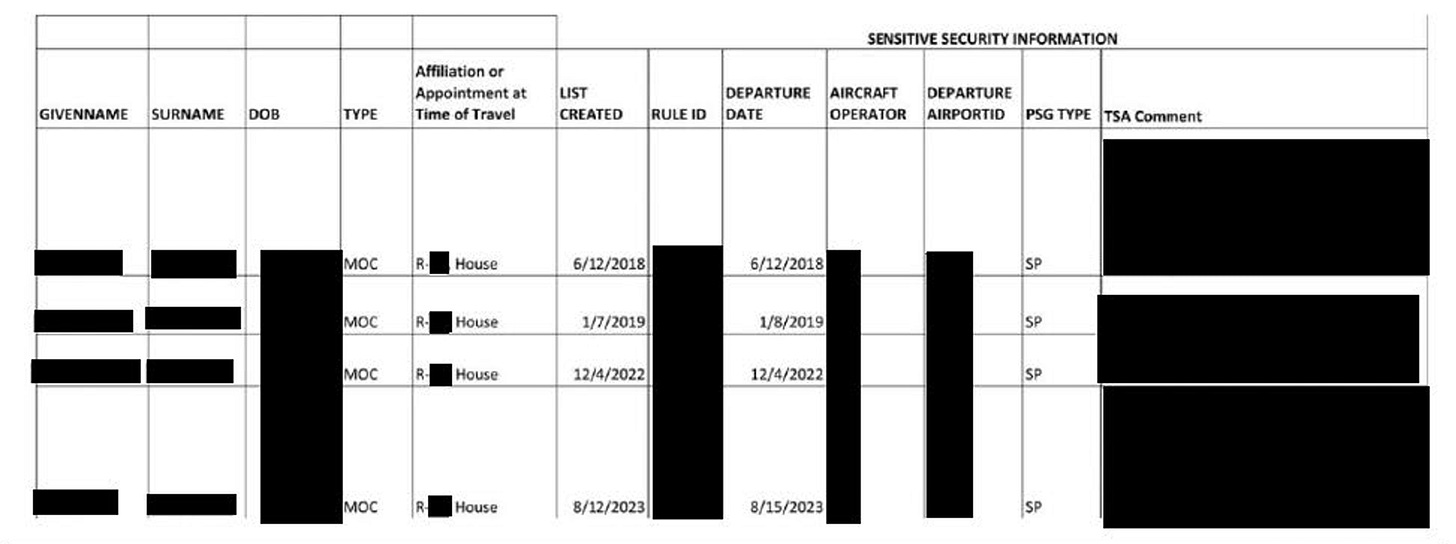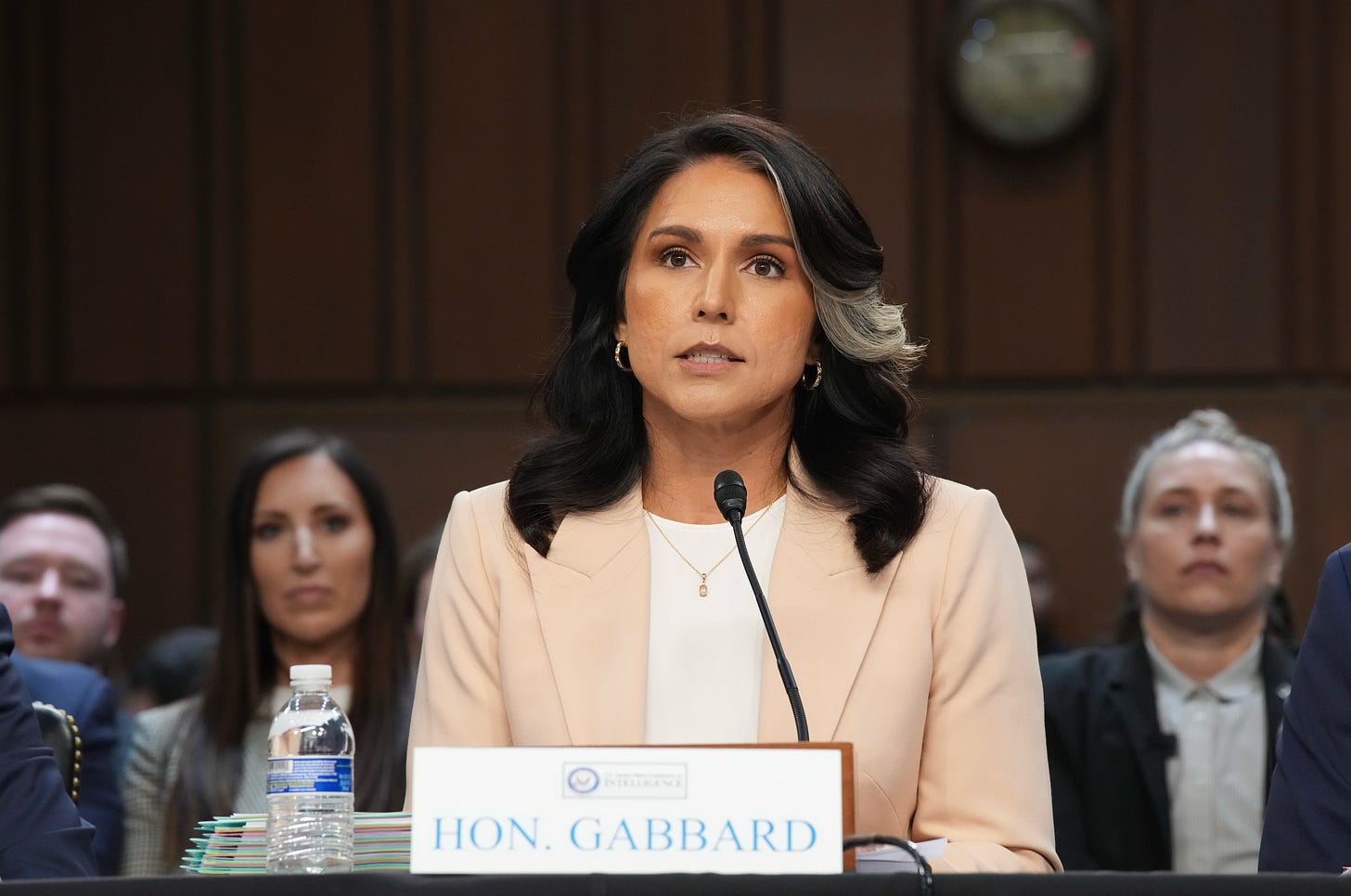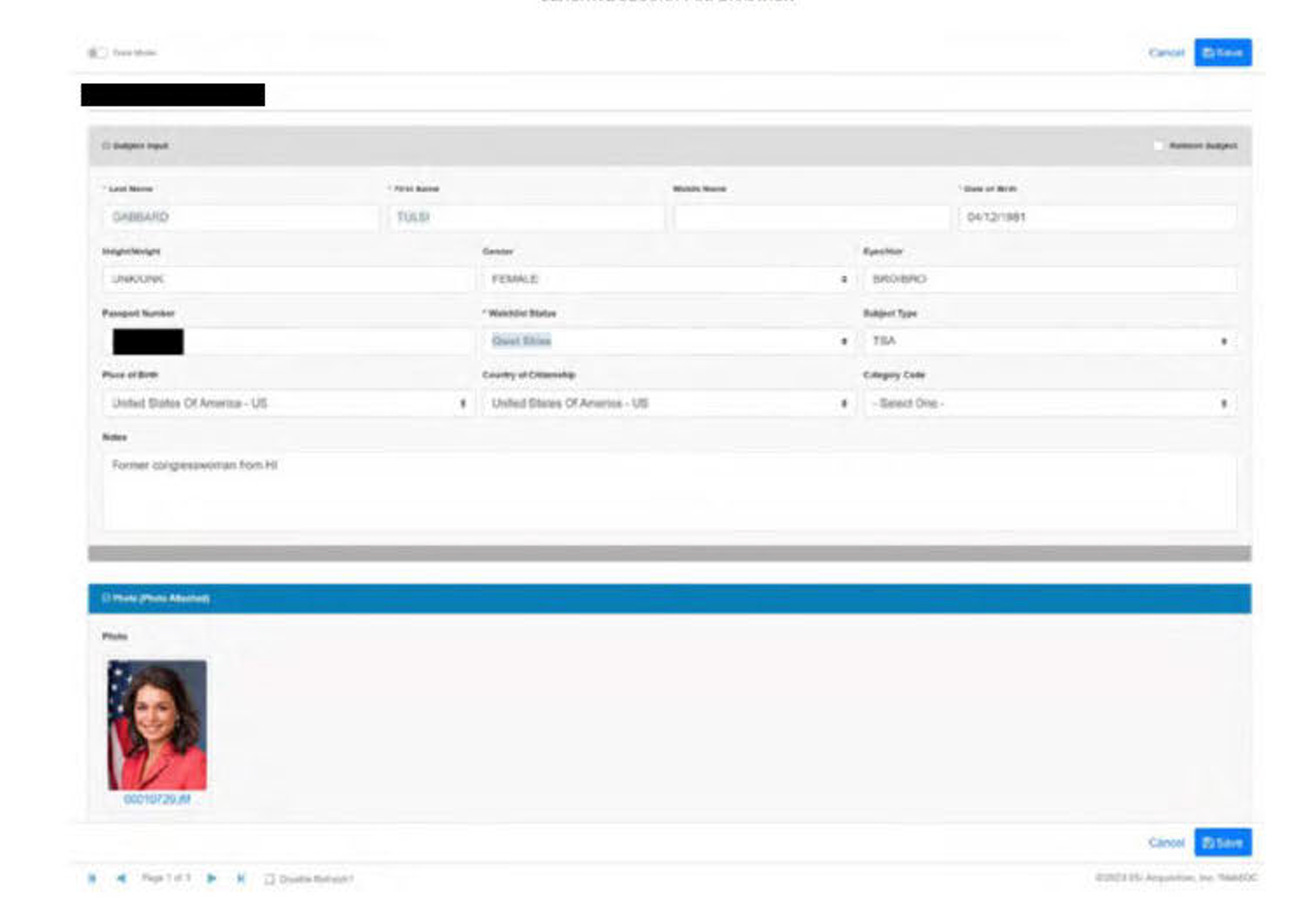Not Only Tulsi: Three Members of Congress Also Spied On In Quiet Skies Program
Exclusive: new Senate documents show members of Congress, others placed under an intrusive surveillance for dubious reasons under now-defunct TSA program
Ahead of Tuesday hearings on the subject, the Senate’s Homeland Security and Governmental Affairs Committee (HSGAC) obtained documents showing three members of Congress, all Republicans, were followed under the TSA’s just-discontinued Quiet Skies program, which became infamous last summer when whistleblowers revealed bomb-sniffing dogs and Air Marshals were assigned to follow former Hawaii Congresswoman and future National Intelligence Director Tulsi Gabbard.
The members’ names have not yet been publicly released, but they were turned over to the Committee by the Department of Homeland Security, along with “TSA” notes explaining how they ended up on the list. Two of the three members made it onto the list before being elected, but as the Committee notes, “a cursory review would have revealed them to be a member of Congress, or a decorated U.S. veteran or service member.” The list below looks like four entries, but the second and third are the same member:

A wealth of other information — not just about Quiet Skies but other questionable TSA practices — has been produced to the Committee chaired by Kentucky Senator Rand Paul. Among the revelations:
Documentation showing the TSA approved “enhanced screening” and watchlisting for individuals merely “suspected of traveling to the National Capital Region” in conjunction with January 6th, and who are “believed to pose an elevated risk” but for whom “there is a current lack of specific information relating to unlawful entry into the U.S. Capitol”;
At least 24 people were put into the program for being associated with a group the protested mask mandates, and 12 were placed on a watch list for removing their masks in-flight. The latter act was described in one memo as being “an act of extreme recklessness in carrying out an act that represents a threat to the life of passengers and crew”;
Confirmation that Gabbard was indeed surveilled for eight flights last summer, as UncoverDC and Racket reported. The ostensible justification? She was listed as a “possible affiliate” of a member of the Terrorist Screening Database (TSDB), which at last count contained over a million people. Internal correspondence also shows that after the story was made public, “TSA is looking into the incident with regards to people with access to this information”;
Confirmation that the TSA pulled a web screenshot of Gabbard’s Congressional bio and not an official Passport or other government photo, as would be standard;
Confirmation that the TSA put Christine Crowder, wife of a Federal Air Marshal and upcoming witness Mark Crowder, under “Special Mission Coverage” due to “association of traveling on the same itinerary as a KST,” or Known or Suspected Terrorist. The TSA mistakenly believed Mrs. Crowder entered the Capitol on January 6th, and eventually conceded the episode was a case of “mistaken identity.”
Racket readers will recall a fiasco that spilled into public last August 4th, when UncoverDC (a site run by well-known online journalist Tracy Beanz) ran a story citing travel dates titled “Federal Air Marshal Whistleblowers Report Tulsi Gabbard Actively Under Surveillance via Quiet Skies Program.” When I reached out to Gabbard, she told me “The whistleblowers’ account matches my experience,” and told of a series of intrusive searches dating to July 23, 2024, just after she’d criticized eventual nominee Kamala Harris on The Ingraham Angle, saying she “does not have the strength to stand up to the Military-Industrial Complex.”
Despite reports containing on-the-record sources in UncoverDC and Racket, and a letter to Congress sent by the well-known firm Empower Oversight on behalf of “multiple Federal Air Marshal whistleblowers” complaining about the episode, only Fox, The Hill, and the Washington Examiner and Times among legacy outlets covered the story. The fact-checking site Snopes waited a month to declare it unconfirmed and in need of “more research.” Only after Donald Trump was re-elected and news broke that Gabbard was his likely choice for the DNI position did the mainstream press bound into action — not to question surveillance of a high-profile politician, but to raise questions about Gabbard’s character.
CNN, for instance, wrote “the episode has raised eyebrows among security officials, who point to Gabbard’s history of unusual relationships overseas.” The New York Times waited almost six months, until January of 2025, to say there was no indication Gabbard “did anything wrong” in her overseas trip, but the episode “raised questions about the extent to which Mr. Trump’s nominee to serve as the nation’s top intelligence official adequately weighed the implications of her foreign travels and associations.”
Quiet Skies became known to the public in 2018, when The Boston Globe exposed that the TSA was following 30 people a day (later reports put the number closer to 50), despite the program never once leading to an arrest or preventing a terrorist incident. The program was both intrusive and wasteful, to extreme degrees. Each “selectee” was followed by three (and now, we learn, possibly more) members of the Federal Air Marshal Service (FAMS), in addition to being subject to special searches and examination by bomb-sniffing dogs. A 2019 report of the Homeland Security Inspector General found an astonishing $394 million — nearly half the Air Marshals’ $803 million budget — could have been “put to better use.”
If you were chosen for Quiet Skies coverage, Marshals trained to prevent terrorists from rushing cockpits would instead be asked to try to listen to your in-flight conversations, register the type of smartphone you used, even mark down “what exact times you went to the bathroom, so they could figure out the frequency,” as formal Marshal Robert MacLean put it.
At the time, this was not a partisan issue. The Globe’s hometown Senator, Ed Markey, grilled then-TSA chief David Pekoskie about why his agency would “monitor Americans who aren’t suspected of any crime” and “does the TSA monitor whether Americans go to the bathroom during flights?”
Over the years, however, party interest in Quiet Skies became curiously divided. In 2023, then-Democratic Chair of the same Homeland Security Committee Gary Peters released a report showing a number of concerning details likely unknown to most Americans. For instance, “U.S. travelers may be screened for at least 22 different reasons” (likely 21, now that Quiet Skies has been eliminated). The Peters report however stressed the notion that “certain communities — Muslim, Arab, and South Asian Americans in particular — claim they have been unfairly targeted,” at a time when the program was targeting all sorts of people, including people protesting mask mandates.
Meanwhile, the Trump administration and DHS Chief Kristi Noem ended the program because “since its existence has failed to stop a single terrorist attack while costing US taxpayers $200 million a year,” citing also episodes and documents that “highlight the inconsistent application of Quiet Skies and watchlisting programs, circumventing security policies to benefit politically aligned friends and family at the expense of the American people.”
In 2023, William “Billy” Shaheen, husband of New Hampshire Democratic Senator Jeanne Shaheen, also triggered a Quiet Skies rule by scheduling a flight with a “KST,” meaning a Known or Suspected Terrorist (reportedly immigration lawyer Celine Atallah). After two enhanced searches, Senator Shaheen contacted then-TSA administrator David Pekoske, after which Mr. Shaheen was excluded from Quiet Skies.
The TSA throughout the Gabbard affair maintained that entry into “Quiet Skies” only took place if a person was “matched to a risk-based rule.” The new documents do bear this out, showing for instance in the cases of the three members of Congress that each was put in the program after triggering a rule, identified by a multi-digit numeral. The “rules,” however, are in many cases just arcane combinations of demerits. While we’re unable to disclose the exact “derog” info that might entail, a hypothetical example might be: “A person who falls in a certain age range and traveled to the U.S. from a particular NATO Country and who traveled to one of four Middle Eastern countries in the last two years.”
Gabbard was ostensibly placed in the program because, as the Times reported, she attended an event “at the Vatican that was organized by a European businessman who appeared on an F.B.I. watch list.” Marshals were told this was the reason. The DHS documents include text exchanges between Marshals assigned to cover Gabbard from July 22 of last year. One section describes her as an “affiliate” with a member of the Terrorist Screening Database:
so Gabbard is an affiliate with a TSDB, and since she’s no longer in Congress that’s probably why she hit for the rule.
Yeah I talked with [redacted] about it and that’s the conclusion we came to as well.
cool cool
This explanation isn’t exactly seamless, however. Other well-known Americans should have triggered the same rule and did not. The use of Gabbard’s Congressional photo instead of an official one suggested to multiple former Marshals that there was at least human review of the episode.
“Obviously,” one former Marshal explained, “there is a way for human beings to influence the decision tree above our level.”
Quiet Skies wasn’t just a 9/11 anachronism that wasted taxpayer money and created a high risk of politicized use of federal enforcement resources. MacLean describes how the program complicated ordinary anti-terrorist surveillance, because Marshals were often seated in the backs of planes to watch members of Quiet Skies lists, and terrorists do not rush cockpits from rear seats. In a refrain that’s become common among current and former FBI agents as well as other enforcement or interdiction agents, MacLean complained, “The air marshal’s job is to protect the cockpit and the pilots. Let somebody else do the intelligence and criminal investigative work.” A Merit Systems Protection Board judge dismissed the complaint in early 2020, but the DHS IG agreed with MacLean later that year.
“For those flights covered by Federal air marshals,” it wrote, “seating positions on the aircraft, as well as aircraft layout, impeded sightlines and may have prevented air marshals from visually identifying potential threats.”
Another serious issue involved Marshals being asked to follow selectees all the way out of the airport to see who, if anyone, picks them up. They are asked to do this even overseas. “You’re basically telling air marshals to conduct foreign surveillance,” MacLean said. “It’s crazy.” He pointed to an incident in 2010 in which two Air Marshals had to flee Brazil on “alternate documents.” It wasn’t over Quiet Skies, but it underscores the risk of sending people not trained to operate overseas into the field abroad.
The elimination of Quiet Skies, along with programs like the Global Engagement Center, shows the administration is serious at least about eliminating the most obviously abusive and indefensible security programs. However, as I’ll be testifying this morning in the Senate, there are more. And they need to be reevaluated, and in many cases defunded. Thanks to Senator Paul and his staff for retrieving these documents.








Hundreds of millions of dollars to follow people who questioned mask mandates, while drug cartels and violence take over cities. Almost as if they wanted it that way.
In Tulsi Gabbard's case, her "crime" was criticizing the joy of Kamala. And we just couldn't have that in America.